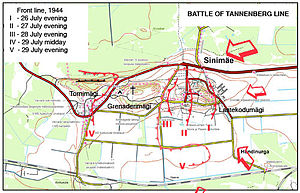Battle of Tannenberg Line
| Battle of Tannenberg Line | |||||||
|---|---|---|---|---|---|---|---|
| Part of Eastern Front (World War II) | |||||||
 Front line positions |
|||||||
|
|||||||
| Belligerents | |||||||
|
|
||||||
| Commanders and leaders | |||||||
| Felix Steiner | Leonid Govorov | ||||||
| Units involved | |||||||
|
III (Germanic) SS Panzer Corps XXVI Army Corps 4 Estonian police battalions Eastern sector, coastal defense Two Estonian border defense regiments |
2nd Shock Army 8th Army 8th Estonian Rifle Corps |
||||||
| Strength | |||||||
| 22,250 troops 7 tanks 70–80 assault guns 49 aircraft |
136,830 troops 150 armoured vehicles 1680 assault guns 546 aircraft |
||||||
| Casualties and losses | |||||||
|
Contemporary estimate: 2,500 dead or missing 7,500 wounded or sick 6 tanks 10,000 total casualties |
Contemporary estimate: 35,000 dead or missing 135,000 wounded or sick 157–164 tanks 170,000 total casualties |
||||||
This is a sub-article to Battle of Narva (1944).
The Battle of Tannenberg Line (German: Die Schlacht um die Tannenbergstellung; Estonian: Sinimägede lahing; Russian: Битва за линию «Танненберг») was a military engagement between the German Army Detachment "Narwa" and the Soviet Leningrad Front. They fought for the strategically important Narva Isthmus from 25 July-10 August 1944. The battle was fought on the Eastern Front during World War II. The strategic aim of the Soviet Estonian Operation was to reoccupy Estonia as a favorable base for the invasions of Finland and East Prussia. 24 volunteer infantry battalions from Denmark, East Prussia, Flanders, the Netherlands, Norway, and Wallonia participated within the Waffen-SS. Roughly half of the infantry consisted of local Estonian conscripts motivated to regain Estonian independence rather than support Nazi power. The German force of 22,250 men held off 136,830 Soviet troops. As the Soviet forces were constantly reinforced, the casualties were 170,000 dead and wounded, and 157–164 tanks.
...
Wikipedia
